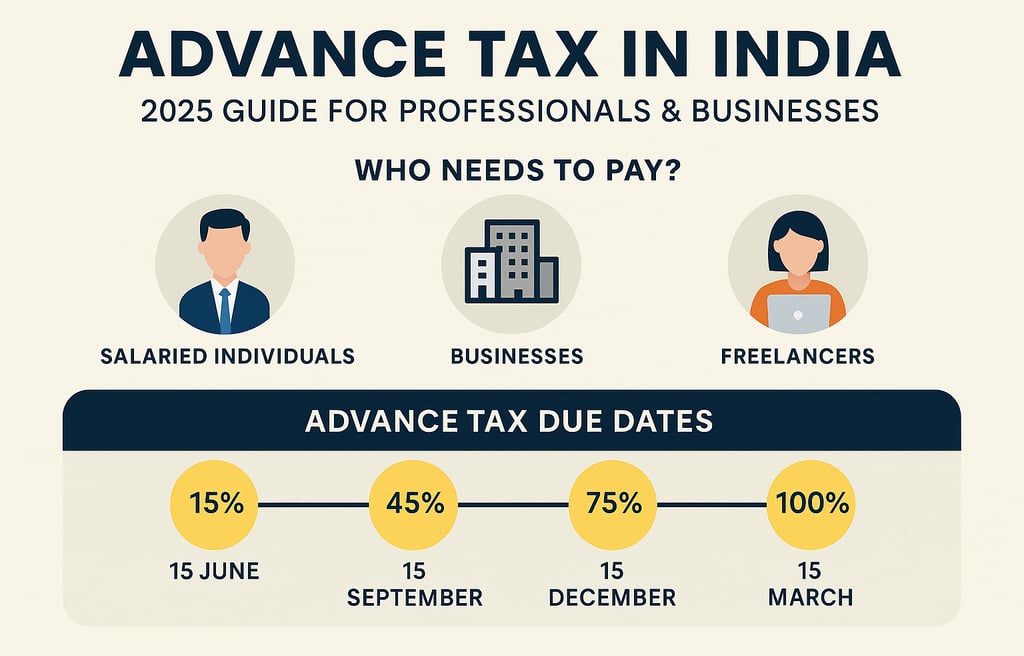Advance Tax in India: Who Needs to Pay and When (2025 Guide)
4/11/20253 min read


Understanding Advance Tax in India (2025 Guide for Professionals & Businesses)
In India’s taxation ecosystem, advance tax plays a critical role in ensuring timely and phased collection of income tax. Commonly referred to as the “pay-as-you-earn” tax, advance tax applies to all individuals, professionals, freelancers, and businesses whose total tax liability exceeds ₹10,000 in a financial year.
Understanding how advance tax works and complying with its deadlines can help taxpayers avoid interest penalties and manage their finances better.
What is Advance Tax?
Advance tax is the payment of income tax in installments, rather than a lump sum at the end of the financial year. It ensures that the government receives tax revenue periodically throughout the year.
This tax is applicable to salaried employees (if they have income sources beyond salary), self-employed professionals, business owners, and even freelancers and traders.
Who Should Pay Advance Tax?
Advance tax is mandatory for:
Individuals with income from rent, interest, capital gains, or business.
Professionals like doctors, lawyers, architects with non-salaried income.
Businesses, including proprietorships, partnerships, LLPs, and companies.
Salaried individuals with other income exceeding ₹10,000 annually.
However, senior citizens (aged 60 and above) not having income from business or profession are exempt.
Due Dates for Advance Tax in FY 2025-26
To ensure timely compliance, the Income Tax Department has laid out specific deadlines for advance tax payments:
15th June – 15% of total tax liability
15th September – 45% of total tax liability (cumulative)
15th December – 75% of total tax liability (cumulative)
15th March – 100% of total tax liability
Missing these dates can attract penal interest under Sections 234B and 234C.
How to Calculate Advance Tax
Step-by-step process:
Estimate total income from all sources including business, interest, rent, capital gains, etc.
Deduct eligible exemptions (like under Sections 80C, 80D, etc.).
Compute total tax liability based on applicable income tax slab rates.
Subtract TDS already deducted (if any).
If balance tax > ₹10,000, pay it in advance tax installments.
Benefits of Paying Advance Tax
Avoids interest penalties and ensures timely compliance.
Helps in managing finances by spreading the tax burden.
Builds a clean and transparent tax profile.
Reduces year-end tax stress and assessment issues.
Common Mistakes to Avoid
Not considering income from all sources (e.g., capital gains, rent).
Ignoring advance tax altogether if TDS is already deducted.
Missing due dates or paying less than the required installment amount.
Forgetting to revise estimates during the year if income increases.
How to Pay Advance Tax Online
Advance tax can be paid online via the official Income Tax portal (https://www.incometax.gov.in):
Select Challan 280 for non-TDS tax payments.
Choose “Advance Tax” under Type of Payment.
Use Net Banking or Debit Card to make the payment.
Save the receipt (challan) for future reference.
Final Thoughts
Advance tax is not just a statutory obligation; it is a smart financial habit for all income-generating individuals and entities. Being proactive about advance tax payments helps you stay tax-compliant while planning better for your financial goals.
If you’re unsure about calculations or payment schedules, reach out to tax consultants or platforms like One Solution, where our advisory team simplifies compliance and financial planning for professionals and entrepreneurs.
Related Blogs:
How Capital Gains Tax Works in India (2025 Guide for Investors)
Understand how capital gains are taxed in India and how advance tax applies to such gains.
Changes in Income Tax Regulations: What You Need to Know in 2025
Stay updated on new tax rules that may affect your advance tax obligations.
What Is TDS in India? A Complete Guide for 2025
Learn how TDS complements advance tax payments and helps in tax planning.
Income Tax Slabs in India for FY 2024-25: Old vs New Regime
Review current tax slabs to calculate your total advance tax liability accurately.
Top Tax-Saving Investment Options in India (2025)
Reduce your advance tax burden by exploring eligible tax-saving investments.
Understanding Self-Assessment Tax vs Advance Tax in India (2025)
Know the difference and when each applies to avoid penalties.
About One Solution
Quick Links
Contact Info
One Solution — Your trusted partner for financial success.
📍 F17, Grand Plaza, Paltan Bazar
Guwahati, Kamrup (M), Assam
India, Pin: 781008
📞 9650072280
© 2025 One Solution. All Rights Reserved.
